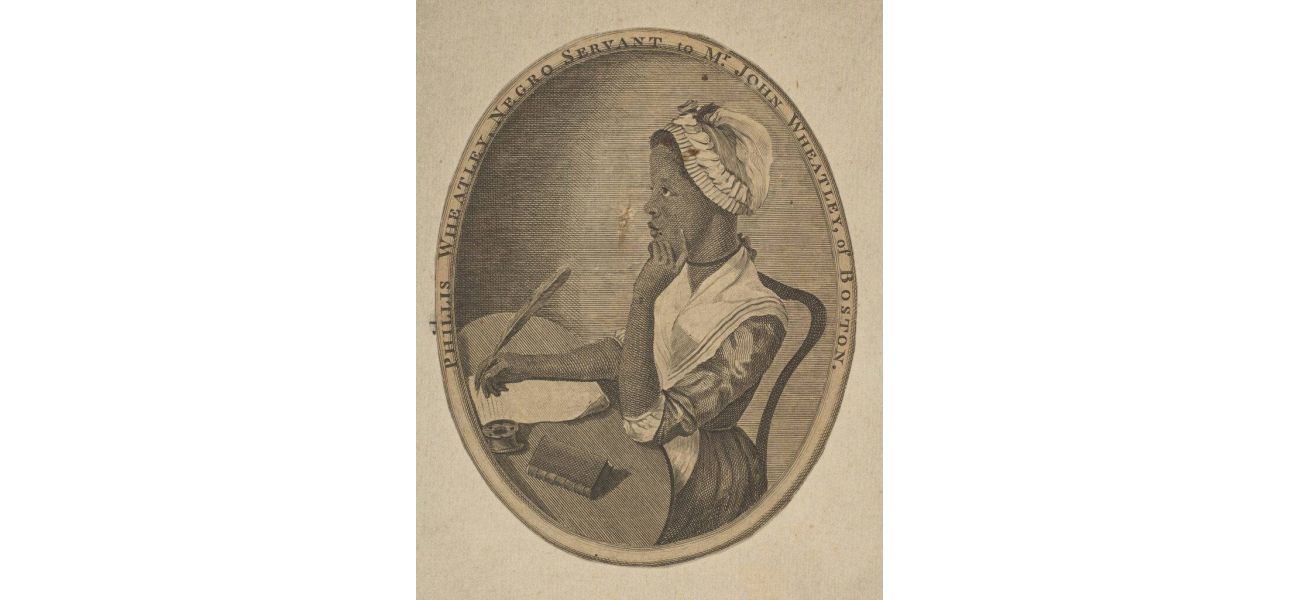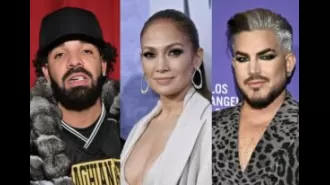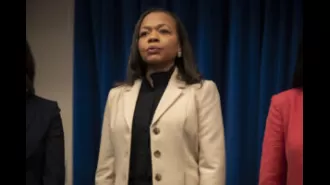Paying tribute to some talented writers on Black Poetry Day.
Black Poetry Day celebrates the impact of poetry in shaping movements, building communities, challenging authority, and empowering poets.
October 18th 2025.

Black Poetry Day is more than just a date on the calendar. It holds a deeper meaning, serving as a reminder of the powerful impact that poetry has had on movements, communities, and challenging authority. Throughout history, poets have been able to use their words as a platform to voice their thoughts and truths. And in the world of literature, there are eight Black poets whose contributions have greatly influenced the American and global canon.
One of these remarkable poets is Phillis Wheatley. Born into slavery, Wheatley's exceptional talent for poetry launched her into the ranks of celebrated poets. Her collection "Poems on Subjects, Religious and Moral" was published in 1773, making her the first Black woman in America to publish a book of poetry. Her verses quickly spread throughout the colonies and even across the Atlantic to England, challenging the 18th-century beliefs about race and intellect. Wheatley's literary triumph became an example for abolitionists to champion the end of slavery and the education and humanity of all people.
Langston Hughes, another prominent figure in the world of poetry, was known for his juggling of roles as a poet, novelist, playwright, and columnist. His poetry was deeply influenced by the syncopated beat of Jazz, capturing the rhythms of life in a way that made poetry accessible and political. His famous works such as "The Negro Speaks of Rivers" and "Montage of a Dream Deferred" still echo today. Hughes was a significant figure in the Harlem Renaissance of the 1920s, using his voice to champion the idea that poetry should come from the people and speak back to them.
Gwendolyn Brooks, born in Chicago in 1917, was a poet, teacher, and activist whose verses delved into issues of race, poverty, family, and the resilience of life. Her Pulitzer Prize-winning collection "Annie Allen" was published when she was just a teenager, making her the first Black writer to receive such an honor. Brooks spent years mentoring younger poets and left an indelible imprint on the Black literary tradition.
Maya Angelou, born Marguerite Johnson in 1928, was a multi-talented poet, memoirist, performer, and activist who made a lasting impact on American culture. Her famous works include the 1969 memoir "I Know Why the Caged Bird Sings" and the poem "On the Pulse of Morning," which she recited at President Bill Clinton's 1993 inauguration. Angelou's career spanned several decades, and she used her words to speak on trauma, communal struggle, and the human experience. Through her lyricism and memoirs, she rose to become a great poet.
Amiri Baraka, born LeRoi Jones in 1934, was a poet, playwright, and polemicist who played a significant role in launching the Black Arts Movement. His body of work, including poems, plays, and essays, focused on Black aesthetics and the call for political self-determination. In the 1960s and 1970s, Baraka's influence was crucial to the movement. He was a prominent figure in the arts scene since the 1950s, constantly using his gaze to highlight the struggles and experiences of Black communities.
Nikki Giovanni, a poet, educator, and influential voice of the Black Power movement, infused love, politics, family, and grief into her verses. She gained recognition in 1968 with her collections "Feeling" and "Black Talk" and became known as the "poet of the people" due to her accessible spoken word. Giovanni's presence in the literary world has remained strong for decades, and her impact is still felt even after her passing.
Rita Dove, a Pulitzer Prize-winning poet and U.S. Poet Laureate from 1993 to 1995, has pushed the boundaries of tradition with her imaginative and skillful use of form. Her contributions to literature have been recognized through numerous awards and honors. Born in Akron, Ohio, Dove rose to prominence through teaching, readings, and high-profile appointments.
Claudia Rankine, a poet, essayist, and playwright, focuses her work on issues of race, media, and the lyric essay with an unflinching intensity. Her 2014 book "Citizen: An American Lyric" weaves together poetry and vivid imagery to expose the subtle forms of everyday racism. This groundbreaking approach has earned her multiple awards and sparked important discussions about the intersection of race and aesthetics. Rankine's work continues to push the boundaries of genre and documentary poetics, confronting issues of microaggressions, spectacle, and the pervasiveness of the racial imagination in everyday life. She co-founded the Racial Imaginary Institute and currently teaches in New York, constantly expanding the limits of literature.
One of these remarkable poets is Phillis Wheatley. Born into slavery, Wheatley's exceptional talent for poetry launched her into the ranks of celebrated poets. Her collection "Poems on Subjects, Religious and Moral" was published in 1773, making her the first Black woman in America to publish a book of poetry. Her verses quickly spread throughout the colonies and even across the Atlantic to England, challenging the 18th-century beliefs about race and intellect. Wheatley's literary triumph became an example for abolitionists to champion the end of slavery and the education and humanity of all people.
Langston Hughes, another prominent figure in the world of poetry, was known for his juggling of roles as a poet, novelist, playwright, and columnist. His poetry was deeply influenced by the syncopated beat of Jazz, capturing the rhythms of life in a way that made poetry accessible and political. His famous works such as "The Negro Speaks of Rivers" and "Montage of a Dream Deferred" still echo today. Hughes was a significant figure in the Harlem Renaissance of the 1920s, using his voice to champion the idea that poetry should come from the people and speak back to them.
Gwendolyn Brooks, born in Chicago in 1917, was a poet, teacher, and activist whose verses delved into issues of race, poverty, family, and the resilience of life. Her Pulitzer Prize-winning collection "Annie Allen" was published when she was just a teenager, making her the first Black writer to receive such an honor. Brooks spent years mentoring younger poets and left an indelible imprint on the Black literary tradition.
Maya Angelou, born Marguerite Johnson in 1928, was a multi-talented poet, memoirist, performer, and activist who made a lasting impact on American culture. Her famous works include the 1969 memoir "I Know Why the Caged Bird Sings" and the poem "On the Pulse of Morning," which she recited at President Bill Clinton's 1993 inauguration. Angelou's career spanned several decades, and she used her words to speak on trauma, communal struggle, and the human experience. Through her lyricism and memoirs, she rose to become a great poet.
Amiri Baraka, born LeRoi Jones in 1934, was a poet, playwright, and polemicist who played a significant role in launching the Black Arts Movement. His body of work, including poems, plays, and essays, focused on Black aesthetics and the call for political self-determination. In the 1960s and 1970s, Baraka's influence was crucial to the movement. He was a prominent figure in the arts scene since the 1950s, constantly using his gaze to highlight the struggles and experiences of Black communities.
Nikki Giovanni, a poet, educator, and influential voice of the Black Power movement, infused love, politics, family, and grief into her verses. She gained recognition in 1968 with her collections "Feeling" and "Black Talk" and became known as the "poet of the people" due to her accessible spoken word. Giovanni's presence in the literary world has remained strong for decades, and her impact is still felt even after her passing.
Rita Dove, a Pulitzer Prize-winning poet and U.S. Poet Laureate from 1993 to 1995, has pushed the boundaries of tradition with her imaginative and skillful use of form. Her contributions to literature have been recognized through numerous awards and honors. Born in Akron, Ohio, Dove rose to prominence through teaching, readings, and high-profile appointments.
Claudia Rankine, a poet, essayist, and playwright, focuses her work on issues of race, media, and the lyric essay with an unflinching intensity. Her 2014 book "Citizen: An American Lyric" weaves together poetry and vivid imagery to expose the subtle forms of everyday racism. This groundbreaking approach has earned her multiple awards and sparked important discussions about the intersection of race and aesthetics. Rankine's work continues to push the boundaries of genre and documentary poetics, confronting issues of microaggressions, spectacle, and the pervasiveness of the racial imagination in everyday life. She co-founded the Racial Imaginary Institute and currently teaches in New York, constantly expanding the limits of literature.
[This article has been trending online recently and has been generated with AI. Your feed is customized.]
[Generative AI is experimental.]
0
0
Submit Comment





